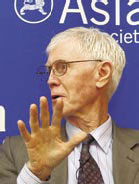Special
Expert calls media in China more thorough and accessible
Updated: 2011-05-27 14:21
(China Daily)
|
|
When Orville Schell first arrived in Beijing in 1975, the only news the former dean of the journalism school at UC Berkeley in California could access was "a little news release printed on brown paper made of rice husks", offering rudimentary news on the outside world.
Now, Chinese media coverage is much more comprehensive, including reports on critical issues such as food safety, said Schell, who is now head of the Center on US-China Relations at the Asia Society.
"From that point to now, I think we see a much more open situation of certainly a much more commercialized media and a more competitive media scene," Schell said.
Since the 1980s, as economic reforms took place in China, State-owned media companies in China have been encouraged to cater to the needs of readers and the market. With the advent of the Internet and the increasing online population of more than 450 million, the media landscape has proved to be a test of the independent dissemination of information in China.
Acknowledging that there has been more aggressive and critical reports done by Chinese media, Schell believes that it will be in China's interest to be able to be more self-critical about itself to help solve problems as they arise. "And it's a very critical role of media," he said.
"I think certainly the China media coverage has advanced in the last 30 years, and China Daily is a very good example of that," said Winston Lord, a seasoned American diplomat who was the US ambassador to China from 1985 to 1989 under Presidents Ronald Regan and George H.W. Bush.
However, Lord still believes that the censorship of the media in China is a problem, which he describes as "a crippling restriction".
"I think it's an obstacle to China's future growth and stability," Lord added.
Lord admits the US media also has its own shortcomings.
"It's not censorship but it's the irresponsibility - cable television in particular - the over simplification, the polarization, the toxicant environment, the 'got you' mentality," he said.
"It's a different order of problems, but I prefer our problems to China's. But I don't want it to look like the US is perfect and China always has to live up to our standards."
Specials

Suzhou: Heaven on Earth
Time-tested adages sing praises of Suzhou, and Michael Paul Franklin finds it's not hard to understand why on a recent visit.

The sky's the limit
Chinese airline companies are increasingly recruiting pilots and flight attendants as the industry experiences rapid expansion.

Diving into history
China's richest cultural heritage may lie in the deep, like exhibits in a giant underwater museum.
